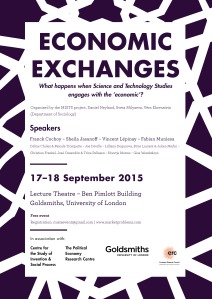AoM PDW: Entrepreneurial Opportunity: Oxygen or Phlogiston?
Posted: 24 July 2015 Filed under: entrepreneurship | Tags: Academy of Management, entrepreneurial opportunity, entrepreneurship Leave a commentI’m really sorry I’ll be missing this. There should be more events like this one, where long-standing foundational concepts are provocatively (in a good sense) challenged:
Title: Entrepreneurial Opportunity: The Oxygen or Phlogiston of Entrepreneurship Research? (session #365)
Date & Time: Saturday, August 08, 2015, 12:30:00 PM – 3:00:00 PM
Hotel & Room: Vancouver Convention Centre, Room 012
* * * * * * * *
Entrepreneurial Opportunity: the Oxygen or Phlogiston of Entrepreneurship Research?
ABSTRACT
Reference to and debate about the notion of entrepreneurial opportunity has grown rapidly in entrepreneurship research in the last 10-15 years (Davidsson, 2015). The central role it has achieved is underlined by the fact that the concept is included in the new domain statement of the Entrepreneurship Division of AoM.
While spurring new research directions, “opportunity” is also an elusive notion. There is no agreement on the essential nature of entrepreneurial opportunities, and even those who subscribe to distinct “paradigms” or “theories” of entrepreneurial opportunities struggle with internal consistency regarding whether such entities fundamentally are individual cognitions, social constructions, or sets of objective, external conditions. Capturing “opportunities” in empirical research is also a major challenge. As a result, many central questions concerning entrepreneurial opportunities remain unanswered. So, should “entrepreneurial opportunity” remain a central building block in entrepreneurship research? Is it the oxygen that can give life and vigor to future entrepreneurship research? Or has it now become more like phlogiston; a once helpful idea that has become dated and instead threatens to stifle further progress? Are there better ways to conceptualize and empirically capture the underlying phenomena?
Continued here:
Economic Exchanges event, Goldsmiths, 17-18 September 2015
Posted: 24 July 2015 Filed under: actor-network theory, market studies, valuation studies | Tags: ANT, market studies, STS, Valuation Studies Leave a comment
Economic Exchanges
17th-18th September, 2015
Goldsmiths, London
Organisers: Daniel Neyland, Sveta Milyaeva, Vera Ehrenstein
Funded by: ERC project MISTS
At this event, we will ask: What happens when Science and Technology Studies engages with the economic?
Further information on the event including a programme and abstracts can be found here: http://www.marketproblems.com/economic-exchanges-event.html
At the event we will assess what STS work on ‘the economic’ could gain from an exchange with the broader STS community and vice versa. We will discuss the analytic utility of considering the economic in relation to STS research into legal and political formations, notions of embodiment, work on publics, consultation, issue formation and sociotechnical controversies, ideas of expertise, the performative turn, and what it means to move from scientific laboratories to sites of economic innovation.
The event will include four keynote speakers: Franck Cochoy, Sheila Jasanoff, Vincent Lépinay and Fabian Muniesa.
Alongside the keynote presentations will be a number of shorter presentations and discussions involving: Céline Cholez and Pascale Trompette, Joe Deville, Lilliana Doganova, Brice Laurent and Julien Merlin, Véra Ehrenstein, Christian Frankel, José Ossandón and Trine Pallesen, Noortje Marres, Sveta Milyaeva, and Gisa Weszkalnys.
The event is free to attend, but we do require registration for catering (etc). To register please send an e-mail (including any dietary requirements) to: mistsevent@gmail.com
CfP: 6th Organizations, Artifacts & Practices (OAP) workshop, Lisbon, 23-24 June 2016
Posted: 24 July 2015 Filed under: OAP, STS | Tags: materiality, socio-materiality, STS Leave a commentThe topic of this year will be “Materiality and Institutions in Management and Organization Studies:”
http://www.drm.dauphine.fr/fr/assets/components/drm/PDF/CallForPapers_OAP2016.pdf
PhD STS Advanced Methods training at Cardiff
Posted: 24 July 2015 Filed under: actor-network theory, qualitative research | Tags: ANT, Cardiff University, laboratory studies, methodology, research methods, science studies, STS Leave a commentAdvanced research methods in Science and Technology Studies (STS): Laboratory Studies
28-30th October 2015, School of Social Sciences, Cardiff Unviersity.
This short course is the first in series of training events, funded by the ESRC, offering advanced methods training relevant to Science and Technology Studies. In contrast to debates around different schools of thought (e.g. Sociology of Scientific Knowledge or Actor Network Theory), STS training tends to pay less attention to methodological issues. This course aims to remedy this, focusing on three different STS-specific methods: Laboratory studies, Interviews with scientists and Imitation Games.
This first course focuses on Laboratory studies, one of the first distinct points where the sociology of science began to develop its own methodological approaches, leading to such classic studies as Laboratory Life (Latour and Woolgar) or Changing Order (Collins).
Drawing on the extensive experience in ethnographic and qualitative methods at the Cardiff School of Social Science, this course will cover a theoretical component, contrasting the varying methodological positions underpinning classic laboratory studies (such as ‘naïve observation’ and ‘informed observation’) as well as a practical element, spending time carrying out observations in a lab. A key aspect of the course will be encourage students to develop ideas about those sites in which they plan to carry out their research.
Course staff include: Professor Harry Collins
Professor Adam Hedgecoe
Dr. Jamie Lewis
The course is suitable for PhD students and more experienced researchers.
This course is free of charge and travel bursaries are available for non-Wales DTC PhD students.
To reserve a place on this course, please contact Adam Hedgecoe <hedgecoeam@cardiff.ac.uk>